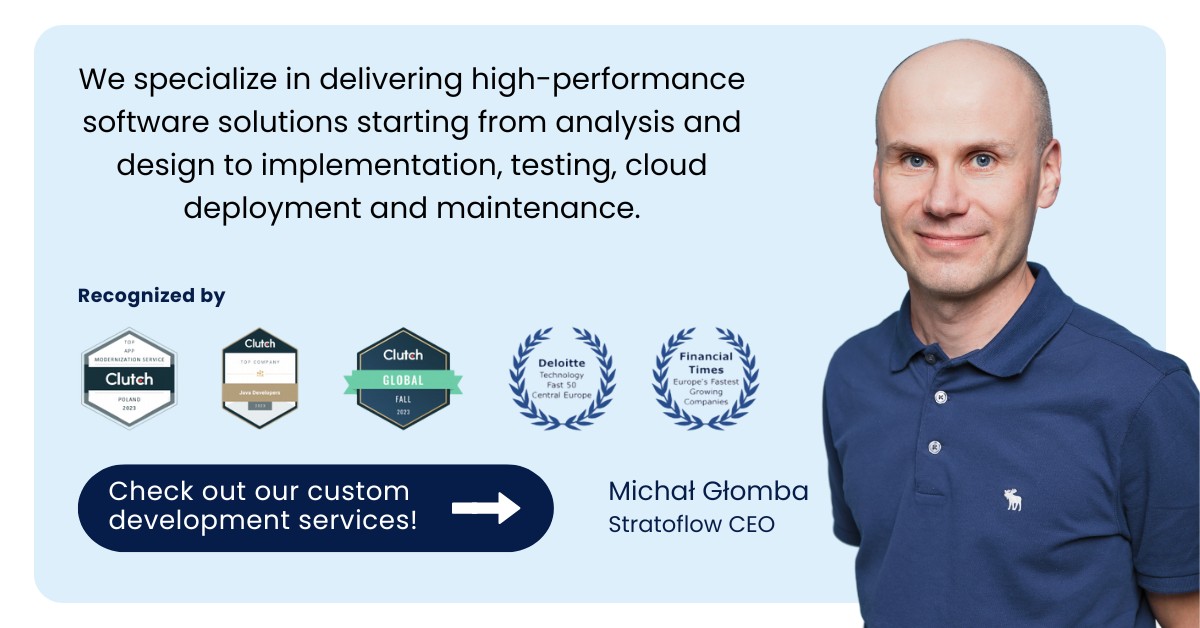
A Comprehensive Guide to Digital Transformation in Real Estate
How are property transactions changing with digital transformation in real estate?
This often-searched question has an answer in the different ways the industry is changing. Find out how things like virtual tours, iBuiyng platforms, custom software, and smart contracts are changing how real estate is done.
And they’re not just changing how things are done, but also how customers experience real estate.
Ready to see what the future of real estate looks like with digital advancements?
Contents
- What is digital transformation in real estate industry?
- Impact of digital transformation on the real estate sector
- 11 Trends of digital transformation in real estate
- Role of AI Proptech in real estate
- Benefits and challenges of adopting digital solutions in real estate
- Successful digital strategy for real estate agents
- Real-life examples of digital transformation in the real estate market
- FAQ
Key Takeaways
- Real estate digital transformation encompasses the integration of new technologies and real estate software to redefine operations and customer experiences, notably through automation, AI, and centralized digital platforms.
- Adoption of digital tech, like smart contracts, custom software, virtual reality, and data analytics, enhances efficiency, customer experience, and informed decision-making in real estate, but requires custom software development to meet unique business needs.
- While leveraging digital innovations offers significant benefits like increased operational efficiency and smarter investment opportunities, it also poses challenges including data security and the need to upskill the workforce.
What is digital transformation in real estate industry?
The digital transformation within the real estate sector plays a significant role.
The most important adoption of digital technologies is the following:
- streamlines operational workflows,
- boosts productivity levels,
- improves customer service,
- enables remote property management.
Digital solutions have an impact on the way property companies conduct business and interact with their clients.
In the era of AI and digital transformation, processes once considered labor-intensive and tedious are now subject to automation and optimization through increased efficiency. Real estate companies are embracing tools like artificial intelligence that have fundamentally changed the day-to-day operations and interactions between agents, sellers, and buyers across the industry.
In fact, this technological renaissance is going beyond just changing business processes – it is reshaping the entire spectrum of the property customer experience.
Impact of digital transformation on the real estate sector
The impact of digital transformation on the real estate sector is profound and far-reaching. Many real estate executives still use old technology, showing that they need to change.
Digital transformation is helping real estate businesses scale, innovate, and maintain a competitive edge in an evolving market.
By embracing digital technology, businesses can increase their operational efficiency through the automation of tasks, resulting in streamlined processes that drive growth and expansion beyond traditional geographic limits.
Moreover, customers in the real estate sector prefer companies that utilize digital platforms, as it simplifies the process, minimizes the burden of paperwork and the need for face-to-face meetings.
The customer experience has been significantly improved through the use of 3D tours, mobile apps, landlord portals, and the ease of online broker connections.
Adopting AI and tech tools in the real estate sector offers new revenue opportunities and key insights into markets, equipping businesses to quickly adapt to new proptech trends.
Digital transformation is crucial for real estate companies to meet changing customer demands and remain competitive through the use of innovative technologies.
If your business is seeking a digital transformation, particularly in the real estate sector, consider partnering with a custom development company that specializes in real estate software development. Such companies, like Stratoflow, bring a wealth of expertise to the table, offering tailored solutions that can significantly improve your operational capabilities and competitive edge.
Now let’s talk about the major digital trends in real estate that are impacting the industry.
11 Trends of digital transformation in real estate
The real estate industry is undergoing a significant digital transformation, with emerging trends significantly influencing its dynamics. Smart contracts, virtual reality, data analytics, and electronic signing are reshaping how real estate entities function and engage their clientele.
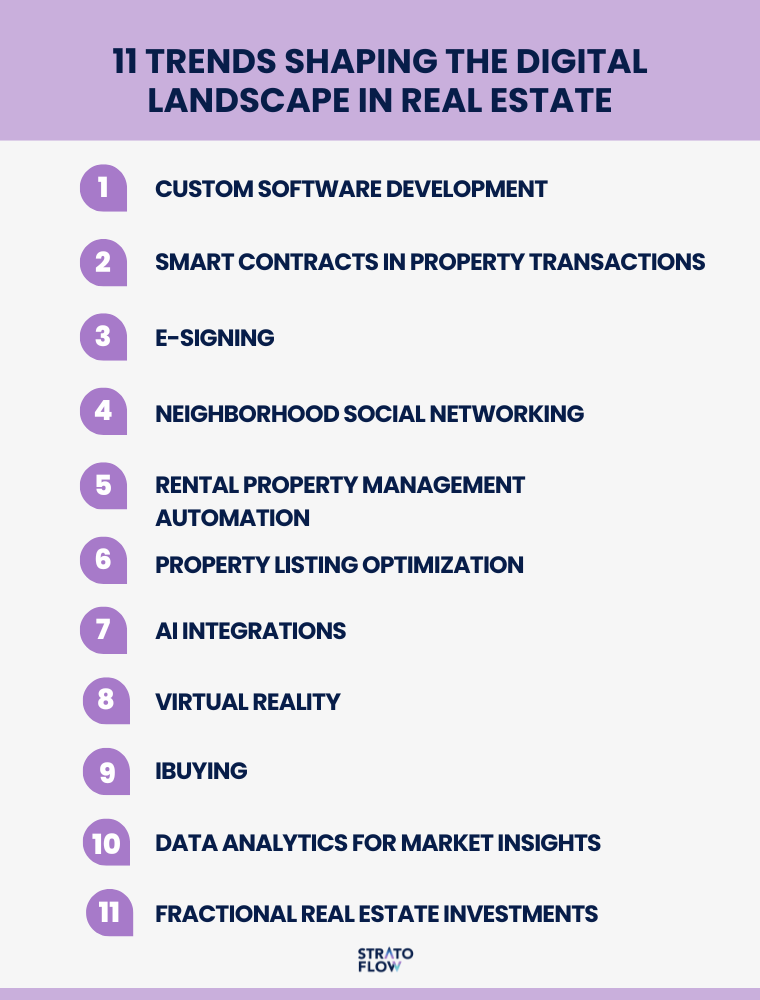
1. Custom software development for real estate
Real estate organizations face unique challenges that generic, out-of-the-box software packages cannot address.
This means that custom software becomes indispensable.
Tailoring software to the unique needs and processes of a real estate company is critical to its success. Customized technology provides the ability to seamlessly integrate with existing systems and additional applications – such as accounting or communications – to increase efficiency and productivity.
Through custom developed software solutions, real estate agents gain capabilities such as:
- Generating reports or contracts at the click of a button
- Managing substantial data volumes with high performance systems
- Enhancing their tools with AI-driven features like price analysis and forecasts, which provide profound insights for industry experts
- Creating bespoke tools like property maintenance systems, building management systems and property management software
- They can collect rent and monitor payments on their personalized dashboard.
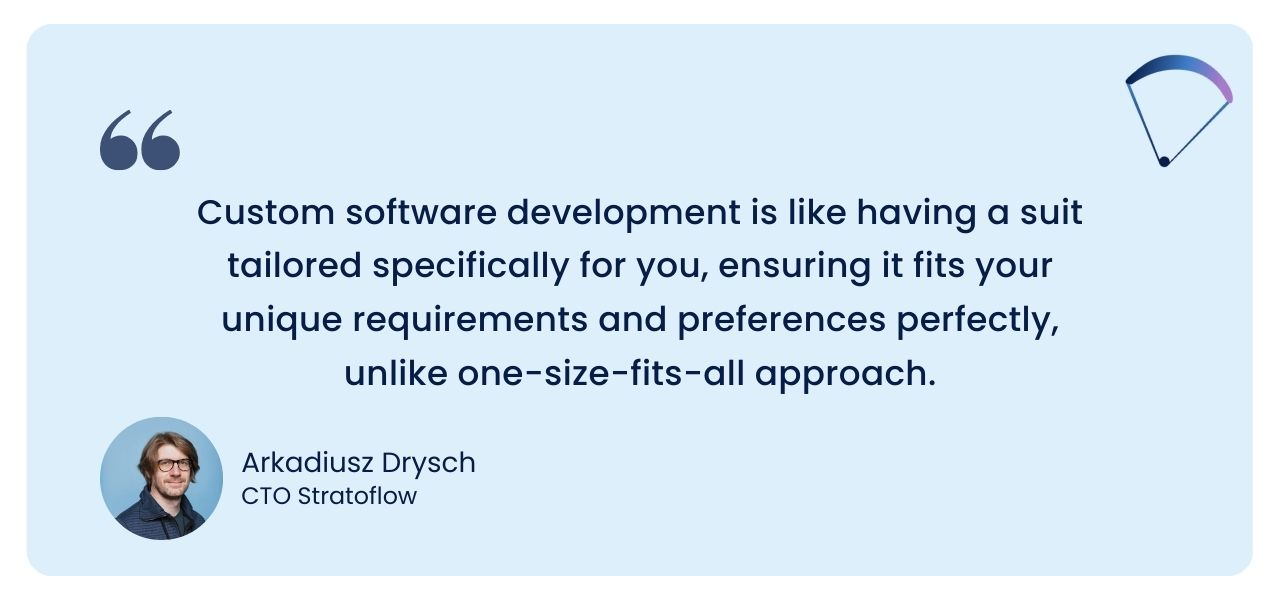
To these enhancements, specialized software solutions are developed precisely for various niches within the real estate industry including:
- Real Estate Property Management Systems
- Inventory Control Applications specific to Real Estate
- Brokerage Software tailored for Real Estates needs
- Platforms designed specifically for iBuying transactions
- Comprehensive Property Listing Services
2. Smart contracts in property transactions
The rise of smart contracts is revolutionizing the property buying and selling process.
Smart contracts offer several benefits
- Transactions are secure, transparent, and efficient.
- They operate on blockchain technology, making them immutable and tamper-proof.
- Smart contracts significantly enhance the level of trust between transaction parties.
The implementation of smart contracts within the real estate industry enhances the speed of transactions, protects against fraud, and significantly reduces associated costs.
This makes property transactions more seamless, quick, and reliable.
This revolutionary change is not only benefiting real estate companies but also property buyers and sellers, making smart contracts a game-changing innovation in the real estate sector.
3. E-signing
Thanks to the legal recognition of electronic signatures in most states across the U.S., there’s no longer an absolute need for physical documentation, which streamlines and accelerates transactions.
By enabling remote signing of real estate contracts, e-signing technology has expedited deal finalization while boosting client satisfaction by simplifying the transactional procedure.
An example can be seen with Camden Property Trust’s adoption of this technology – what once took two weeks for document completion now takes only two days.
The quicker turnaround times mean notable savings in both time and costs while minimizing the effort involved.
4. Neighborhood Social Networking
The real estate industry is being notably influenced by the emergence of neighborhood social networking as a key digital trend.
These software platforms, like Nextdoor, are home to many homeowners and offer a concentrated demographic for real estate agents who want to promote their listings.
Real estate businesses can boost engagement with customers and gain important insights through direct feedback by utilizing interactive elements on these neighborhood-focused social media sites.
As such tools become more prominent in marketing strategies, they facilitate powerful connections between property owners and local communities.

5. Advancements in Rental Property Management Automation
The emergence of automation in rental property management is an important digital movement within the real estate sector.
Artificial Intelligence tools are streamlining various activities including collecting rent, providing tenant assistance, and managing upkeep tasks, thereby improving the productivity of handling rental properties.
Automation solutions have the potential to supplant hands-on tasks related to real estate like:
- Conducting property inspections
- Maintenance management
- Engaging in digital marketing efforts
- Processing invoices
- Handling customer support
- Improving communication
- Faster and easier rent collecting
This integration simplifies processes substantially. For property managers involved in renting out properties, a key benefit derived from employing automation technologies lies in heightened operational efficiency.
6. Property listing optimization
AI and machine learning technologies streamline listing creation through advanced data analysis and provides insightful recommendations to enhance:
- The pricing strategy
- Descriptions of properties
- Quality of imagery used in listings
- Selection of strategic keywords
- Deployment of potent marketing tactics
Real estate practitioners benefit from these optimization tools by gaining time efficiency, increased precision in their listings, and enhanced exposure and appeal.
This technology does more than just streamline listing management. It amplifies visibility while tailoring the offerings to captivate a larger audience of prospective buyers or tenants.
7. Real estate AI integration
The incorporation of Artificial Intelligence in real estate is revolutionizing operational processes for companies in this sector. Through rapid analysis of vast data sets, AI empowers property investors by streamlining the process of identifying deals and providing more accurate and efficient property evaluations.
Within diverse facets of the real estate industry, AI’s application ranges from utilizing chatbots that handle customer queries about properties to deploying sophisticated algorithms for determining precise property values.
It offers automatic translation services which bridge language gaps among various parties involved in transactions, as well as advanced capabilities in property searches that align closely with individual user preferences.
AI equips real estate businesses with analytical tools to forecast market tendencies, valuate property price, and customize their services to meet these anticipated trends effectively.

8. Virtual Reality for property showcases
Virtual reality technology is transforming the way properties are showcased, leading to faster deals and higher prices.
The advent of 3D virtual walkthroughs enables potential buyers to:
- Explore properties without having to physically visit them
- Save time
- View multiple properties in a short span of time
- Make the decision-making process quicker and more efficient
Augmented and virtual reality technologies offer virtual property tours, improving remote viewing experiences and allowing potential buyers to explore listings through 3D walkthroughs, interactive floorplans, and staged custom furnishings and decor.
For instance, Cityscape Realtors harnessed Montuem Virtual Tours, leading to a skyrocketing volume of tours, decreased overhead costs, and a 35% increase in sales conversions. Such examples showcase the potential of virtual reality in redefining property showcases.
[Read also: Future of Real Estate: Space as a Service Model]
9. iBuying
iBuying is a practice that employs artificial intelligence to revolutionize how properties are bought and sold.
These platforms use AI to assess homes quickly and make instant offers, streamlining the sales process and accelerating property transactions.
It’s noteworthy that 41% of purchasers today would consider buying real estate sight unseen, highlighting considerable openness within the marketplace toward iBuying methods. Digital advancements such as iBuying do more than offer avenues for astute investing—they also influence how consumers interact with the real estate industry.

10. Data Analytics for Market Insights
In the real estate industry, data analytics is indispensable for discerning patterns in customer behavior and market trends.
It allows companies to utilize historical data alongside machine learning algorithms to better predict what customers are looking for, enhancing service personalization and anticipating shifts in the market.
The use of sophisticated analytics can identify lucrative opportunities within the real estate sector while supporting critical decision-making processes. Big data is essential for assessing both risk factors and potential returns on a property – information that’s critical for developing effective investment strategies and determining pricing structures.
By consolidating disparate elements such as listing specifics, contract frameworks, metrics related to consumer interactions into cohesive databases — and by refining operational procedures — businesses are equipped with insights necessary for estimating a property’s future performance and simplifying management tasks connected with properties.
Implementing robust data analysis tools equips businesses with enhanced operational efficiencies leading to more strategic decisions within the realm of real estate. This approach not only hones process streamlining, but also bolsters confidence when navigating this complex industry landscape.
11. Fractional Real Estate Investments
Fractional real estate investing highlights a significant digital innovation in real estate investing, facilitated by advances in real estate technology (PropTech).
This investment model allows individuals to
- Acquire fractional interests in real estate assets, thereby reducing capital requirements.
- Invest directly in shares of specific properties or real estate funds.
- Acquire co-ownership of tangible real estate assets, providing a real stake in physical assets.
Unlike timeshares or shared vacation ownership, fractional real estate investments through crowdfunding platforms offer a more passive, professionally managed investment model. This distinction means that investors can benefit from real estate ownership without the day-to-day responsibilities of direct management.
However, access to these platforms can be limited. Many require investors to be accredited, potentially excluding non-accredited individuals from participating in certain high-potential opportunities.
With the real estate crowdfunding market expected to grow significantly, reaching an estimated $250.6 billion by 2030, the need for specialized tools to manage these investments is increasing.
Investors and management firms are turning to customized software solutions designed to streamline property management. These PropTech systems increase operational efficiency, and improve overall investment oversight. These technology tools are essential to the effective management of fractional ownership, ensuring that investors can maximize returns from their real estate portfolios.
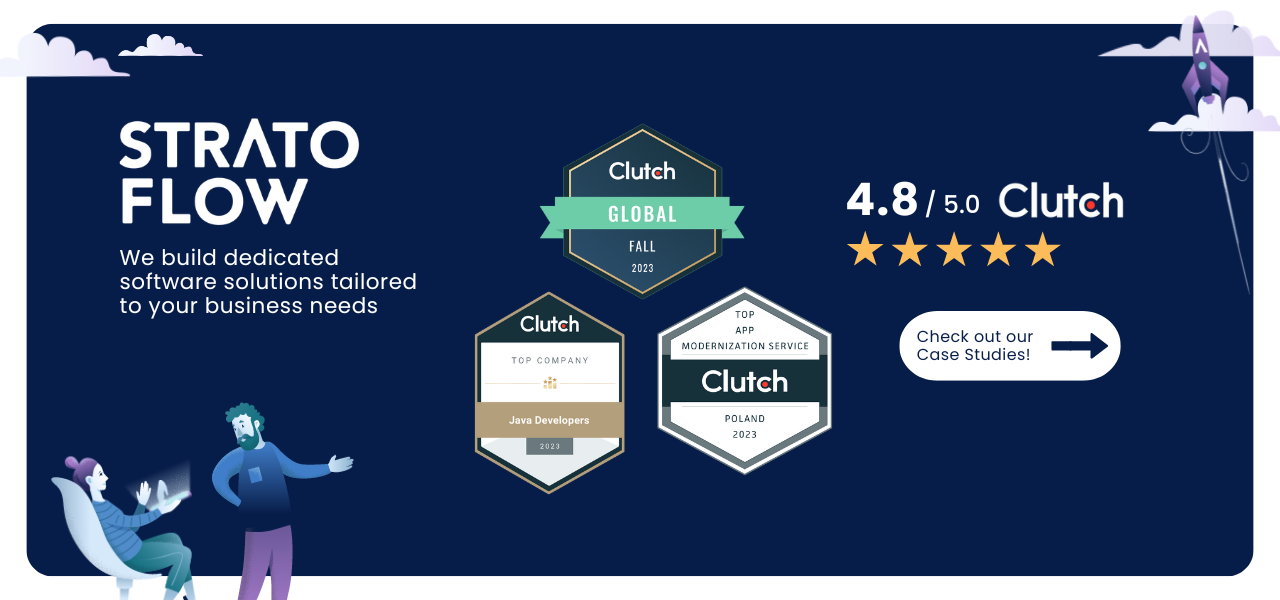
Role of AI Proptech in real estate
By quickly sifting through large amounts of data, AI helps real estate investors discover deals and increases the accuracy of real estate appraisals with speed and precision. The use of AI has greatly improved the accuracy and efficiency of real estate appraisals.
Here are ways AI is changing the game in real estate:
- It streamlines processes to boost efficiency
- Aids strategic decision-making via extensive data analytics
- Uses predictive analytics along with machine learning algorithms to swiftly provide customers accurate property suggestions
For instance, Zillow leverages tools powered by AI for improved lead generation as part of their offering.
AI alongside machine learning technologies is increasingly being incorporated into various aspects of the real estate business.
This integration allows firms to tailor experiences based on a deeper understanding of customer behavior patterns.
In practice, this includes:
- Sophisticated chatbots programmed with machine learning capabilities that adaptively discern and foresee client preferences while delivering tailored services coupled with effective pairing between clients and properties.
- Virtual assistant solutions infused with AI technology providing detailed information about listings, coordinating viewings effortlessly, as well as fielding routine inquiries.
- Employing predictive analysis which utilizes complex machine learning algorithms designed to examine market trends thoroughly for forecasting future valuation trajectories.
Projections show that by 2023, spending on these cutting-edge chatbot applications could reach an impressive $5.6 billion – demonstrating a significant trend toward the adoption of such platforms in areas such as real estate service offerings.
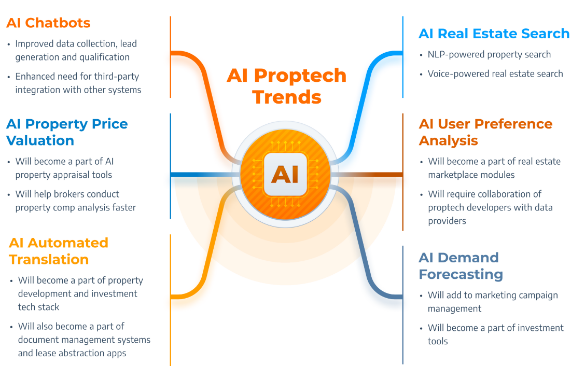
Source: Ascendix
AI-Driven Property Valuations and Predictions
Tools powered by AI have revolutionized how investors assess critical data points for precise property valuations and profit forecasts.
The introduction of the C3 AI Residential Property Appraisal tool in Riverside County, California has markedly improved both the efficiency and precision with which properties are appraised.
Machine learning algorithms allow companies to swiftly review and evaluate properties, leveraging historical data to accurately forecast potential investment returns prior to acquisition.
Firms such as Redfin and Zillow harness artificial intelligence along with machine learning methods in order to ascertain property values—a cutting-edge approach for anticipating upcoming market conditions.
Personalized Customer Service Through Machine Learning
In the real estate sector, AI platforms utilize conversational artificial intelligence and natural language processing technologies to interact with prospective customers, delivering a highly personalized customer experience. Advantages of implementing AI in this field include:
- Better engagement with potential leads
- Customization of services to align with individual client preferences
- Streamlined processes for qualifying and nurturing leads
- Improved communication channels and support for customers
Through the integration of AI chatbots along with strategies that focus on personalizing marketing efforts, there is a marked increase in both lead engagement as well as customization capabilities which result directly from understanding each customer’s unique preferences.
AI-driven solutions facilitate more effective targeting in marketing campaigns by identifying key moments for message delivery to amplify impact.
For example, Hyro has developed an innovative virtual real estate agent utilizing artificial intelligence capable not only of capturing but also of maximizing lead generation across multiple digital touchpoints.
These intelligent chatbots operating within the realm of real estate offer prompt and tailor-made interactions 24/7. This capability provides constant assistance via online platforms ensuring queries are addressed instantly at all times.
Beyond chatbots, the real estate industry is also leveraging AI for administrative efficiencies, such as AI-driven email automation and smart reminders.
AI email senders can personalize communications at scale, sending tailored messages to different customer segments based on their interactions and behaviors. This capability ensures that marketing and operational communications are relevant and timely, significantly improving open rates and engagement.
Intelligent reminders play a critical role in property management. For example, if a tenant is late with a payment, AI systems can automatically send reminders tailored to the tenant’s specific situation and history.
These reminders can escalate in tone based on the length of the delay and previous interactions, and can even suggest payment solutions or offer financial management assistance to maintain a positive landlord-tenant relationship.
[Read also: Top 8 HOA Management Software Solutions: A Comprehensive 2024 Guide]
Benefits and challenges of adopting digital solutions in real estate
There are many benefits to integrating digital solutions into the real estate industry.
The journey towards digital transformation has notably improved customer service by enabling continuous support, tailoring recommendations to individual needs, and streamlining the resolution process for issues.
Real estate companies gain increased operational efficiency and cost reductions through comprehensive property listings and advanced search capabilities.
Most business owners are convinced that AI will advance their enterprises while simultaneously enriching customer relationships.
While digitization could lead to a reduction in the real estate workforce, it also opens the door to redeploying employees to more impactful roles.
To combat compartmentalized data stores, or “data silos,” there is an imperative need for organizations in this space to adopt systems that facilitate cohesive data stewardship throughout.
Integrating these technologies does not come without its set of hurdles.
- Scaling back expenses requires automating processes which depend on tech-proficient staff
- Filling gaps in proficiency as some professionals struggle with transitioning to modern digital apparatus
- Establishing robust measures concerning data security including strategies such as prevention against data loss, encryption of assets, secure sharing protocols for documents. Regular checks against system vulnerabilities.
Yet these obstacles can be surmounted through the implementation of appropriate tactics alongside resource investment.

Increasing operational efficiency across business processes
The implementation of digital solutions can significantly improve the operational efficiency within various business processes in the real estate sector.
Benefits derived from adopting such digital measures include:
- Reduction of paper waste
- Enhancement of organizational effectiveness
- Minimization of both environmental impact and expenses linked to the management of physical documents
Adopting electronic signature mechanisms is one way real estate agencies may realize these improvements.
Advancements in technology provide tools like CRM systems built for enterprises, platforms that enable automation, and intelligent AI-driven real estate utilities that all work together to bolster operational productivity.
They aid not only in generating leads and analyzing markets, but also streamline transaction procedures within the realm of real estate.
These technological innovations pave the way for reduced operating expenditures while advocating substantial savings through a reimagined approach to traditional industry practices.
Navigating data security in the digital real estate ecosystem
In the digital domain of the real estate ecosystem, safeguarding data is imperative.
The industry’s firms are taking rigorous steps to bolster their defenses against cyber threats in an effort to avert both fiscal losses and damage to their reputation stemming from any potential breaches.
With the adoption of cloud-based solutions, not only has data security within real estate been enhanced, but it has also contributed to reducing costs associated with business operations.
Within the sphere of real estate transactions conducted online, electronic signature platforms are employing formidable security protocols that include encryption methods and detailed audit trails for additional protection.
Real estate professionals are becoming increasingly vigilant when it comes to defending against fraudulent activities by implementing advanced verification processes.
Innovations such as blockchain technology have emerged prominently in this sector. Companies including SafeWire leverage these advancements for verifying identities reliably during property buying and selling procedures.

Successful digital strategy for real estate agents
In the realm of real estate, agents can significantly benefit from incorporating digital tools into their business practices as a part of an effective digital strategy.
Development of mobile and web applications is crucial for providing swift access to property listings and details for customers. These apps grant real estate professionals a conduit through which they can engage with clientele, address inquiries, and deliver customized services.
Enhancing appointment scheduling processes is another vital element in fortifying the digital strategy for real estate practitioners.
By integrating added features into real estate broker software solutions, agents are better equipped to organize meetings and interactions with clients efficiently. Not only does this promote seamless operations, but it also plays a significant role in increasing customer satisfaction levels.
[Read also: Best Real Estate CRM Software Systems in 2024]
Real-life examples of digital transformation in the real estate market
Real-life digital transformation examples in the real estate market provide a testament to the benefits of technology adoption.
For instance, Sotheby’s International Realty has utilized technology acquisitions such as Microsoft 365 and Amazon SES to upgrade their internal operations and email security. Zillow has adopted a ‘housing super app’ strategy that integrates virtual tours and mortgage services, achieving notable improvements and financial gains.
Another example is custom real estate software development with Openkoda.
It is a pre-built open source real estate application specifically designed for real estate needs.
With Openkoda, you don’t have to start from scratch.
You can build your real estate software on a robust core that is designed to be scalable and extensible, allowing for enhancements at any time and at any scale.
It’s a perfect solution for PropTech startups, property managers, and real estate brokers looking to speed up the property management software development process.
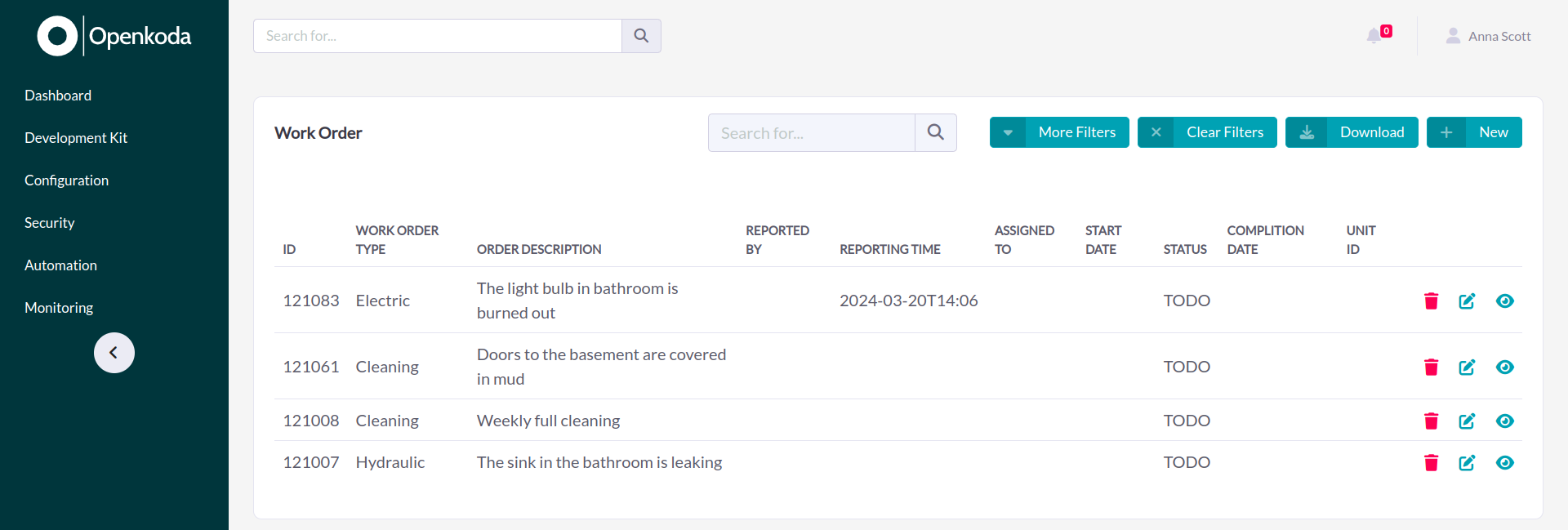
Commercial realtors leveraging new technologies
Commercial real estate professionals are experiencing significant advantages by incorporating new technologies into their operations.
For instance:
- The integration of rlpSPHERE by Royal LePage has led to notable enhancements in the generation and handling of leads.
- There’s been an improvement in professional image projection.
- Client expectations have subsequently risen.
By collaborating with Strong Analytics, a prominent player in the real estate market was able to polish its targeting tactics and marketing initiatives, which culminated in a marked upsurge in revenue.
How property owners benefit from digital solutions
Property owners reap substantial rewards from implementing digital solutions. The digital transformation in real estate leads to:
- Improved efficiency
- Expansion of operations
- Decision-making based on analytics
- Adaptable reporting tools
These digital strategies offer a revolutionary experience within the domain and enable the management of properties remotely, thereby simplifying the oversight process for property owners.
[Read also: Best Real Estate ERP Software Solutions On The Market in 2024]
Summary
In sum, the real estate sector is undergoing a fundamental transformation as digital technologies redefine how business is executed. The integration of AI and machine learning alongside virtual reality advancements and e-signing processes are revolutionizing real estate operations. This shift offers unprecedented prospects for real estate tech companies, agents, and investors within the industry, but also comes with complex challenges that require cautious navigation. As evolution in this field persists, it becomes evident that embracing digital transformation is not merely following a trend. Rather, it’s an essential strategy for thriving within the realm of real estate.
FAQ
What is digital transformation in the real estate industry?
The integration of digital technologies into operational procedures to boost productivity and better customer experiences is a key aspect of the digital transformation occurring within the real estate industry.
How does AI integration benefit the real estate sector?
The incorporation of AI into the real estate sector enhances market analysis, augments lead generation capabilities, and streamlines marketing efforts. Such technological improvements support better decision-making processes and elevate customer satisfaction within the realm of real estate.
What are the benefits of adopting digital solutions in real estate?
Integrating digital solutions into the real estate sector can enhance operational efficiency, elevate customer service quality, and minimize expenses, which collectively contribute to an overall enhancement in business performance.
What are some real-life examples of digital transformation in the real estate market?
Companies in the real estate sector, including prominent names such as Sotheby’s International Realty and Zillow, are adopting digital transformation by utilizing tools such as Microsoft 365 and Amazon SES along with pioneering application strategies. This adoption aims to augment their market presence and improve the customer experience.
How can real estate agents implement a successful digital strategy?
By incorporating digital tools like mobile app development and better scheduling systems into their operations, real estate agents can execute an effective digital strategy that boosts their efficiency and improves the services they offer.
Related Posts
Thank you for taking the time to read our blog post!
